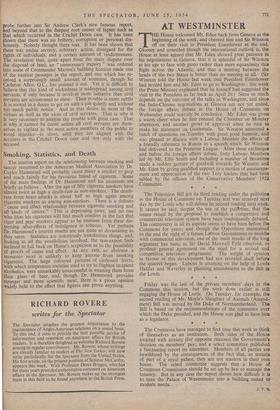AT WESTMINSTER T HE House welcomed Mr. Eden back from Geneva
at the beginning of the week, and cheered him and Sir Winston off on their visit to President Eisenhower at the end. Gloomy and unsettled though the international outlook is, the House at least agreed that Mr. Eden showed great patience in his negotiations at Geneva, that it is splendid of Sir Winston at his age to face with gusto rather than mere equanimity this flight across the Atlantic, and that a meeting between the heads of the two States is better than no meeting at all. (Sir Winston told the House last week that President Eisenhower had invited him and Mr. Eden to go to Washington : this week the Prime Minister explained that he himself had suggested the visit to the President as far back as April 20.) Since so much depends on the outcome of the talks in Washington, and since the Indo-Chinese, negotiations at Geneva are not yet ended, the foreign affairs debate in the House of Commons on Wednesday could scarcely be conclusive. Mr. Eden was given a warm cheer when he first entered the Chamber on Monday afternoon, and another growl of approval when he rose to make his statement on Guatemala. Sir Winston answered a batch of questions on Tuesday with great good humour, and was pleased to discuss with a Labour Member the effects of a friendly reference to Russia in a speech which Sir Winston had delivered to the Primrose League. After these exchanges and before the foreign affairs debate, forty Labour Members led by Mr. Ellis Smith and including a number of Bevanites made a sudden gesture of goodwill towards Sir Winston and Mr. Eden by giving qualified support to a motion of encourage- ment and appreciation of the two Tory leaders that had been tabled by the officers of the Conservative Members' 1922 Committee. * * * The Television Bill got its third reading under the guillotine in the House of Commons on Tuesday and was received next day by the Lords who will debate its ,second reading next week. It cannot be said, despite the use of the guillotine, that the issues raised by the proposal to establish a competitive and commercial television system have been inadequately debated. The controversy in all its aspects seems to have been before the Commons for years; and though the Opposition maintained to the end the right of a future Labour Government to meddle with commercial television, one of the main results of the long argument has been, as Sir David Maxwell Fyfe observed, to produce general agreement on the need for a second and competitive television programme. The weight of opinion in favour of this development had not revealed itself before the quarrel began. Labour is counting on the help of Lords Halifax and Waverley in planning amendments to the Bill in the Lords. * * * Friday was the last of the private members' days in the Commons this session, but the work done earlier is still engaging the House of Lords. On Tuesday, for example, the second reading of Mr. Moyle's Slaughter of Animals (Amend- ment) Bill was moved by the Duke of Northumberland. The Bill is based on the recommendations of the committee over which the Duke presided, and the House was glad to have him as a legislator. * * * The Commons have managed to find time this week to think of themselves as an institution. Both sides of the House awaited with anxiety (for opposite reasons) the Government's decision on members' pay; and a select committee published a fascinating report on amenities. Members of all parties are bewildered by the consequences of the fact that, as tenants of part of a royal palace, they are not masters in their own house. The select committee suggests that a House of Commons Commission should be set up by law to manage the tenancy. But in any case the report shows how difficult it is to turn the Palace of Westminster into a building suited to modern needs.


































 Previous page
Previous page